#de aged philip
Explore tagged Tumblr posts
Text
12 CHAPTER AT THE DAWN OF THE LIGHT IS OUT ON AO3
so i decided to post the rest of the pages i made a year and a half ago
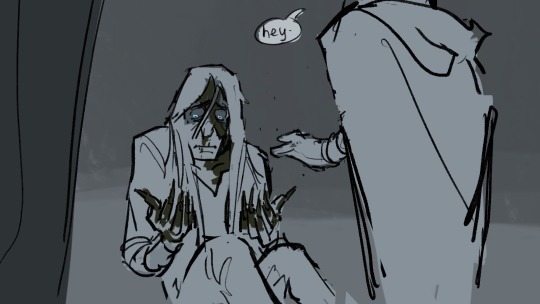
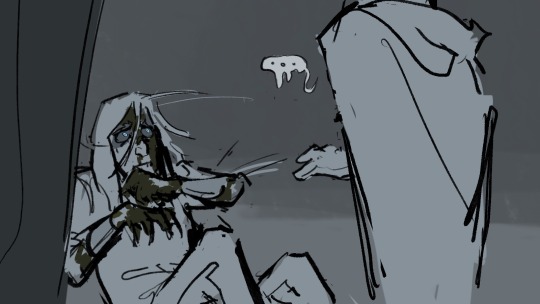
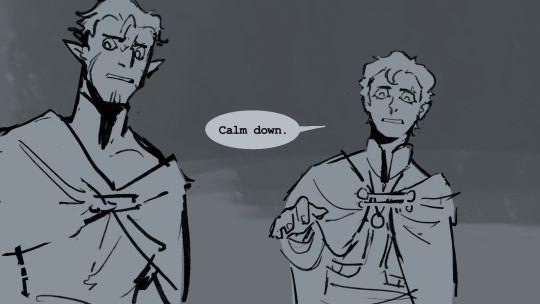
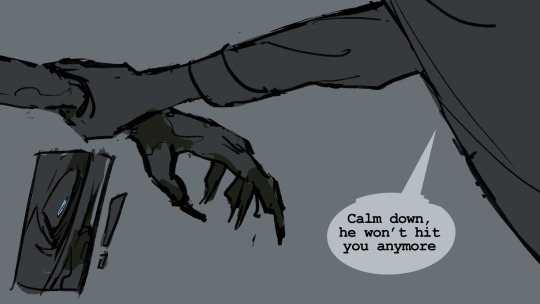
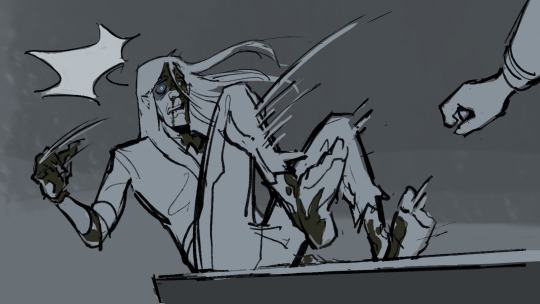
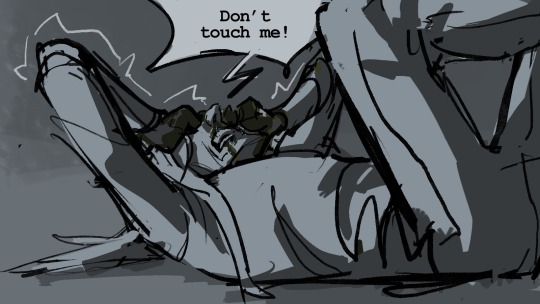
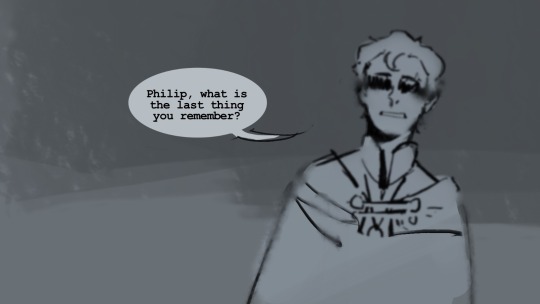
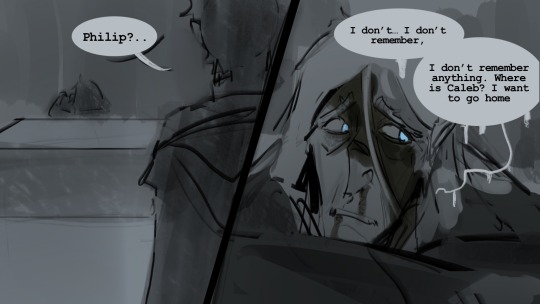
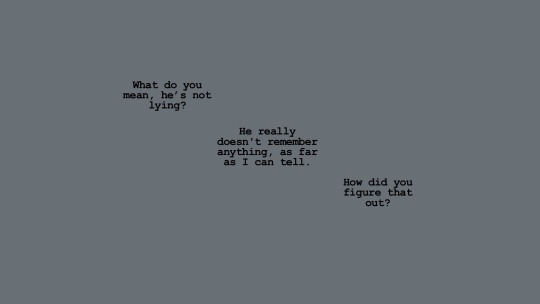



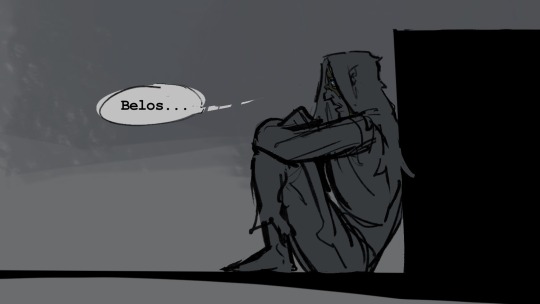
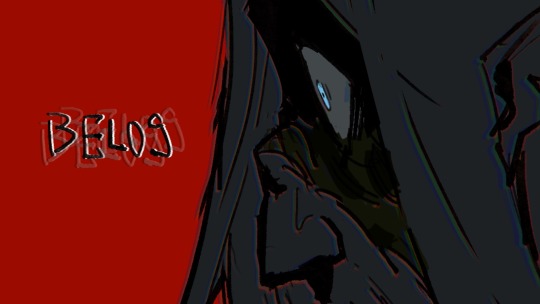
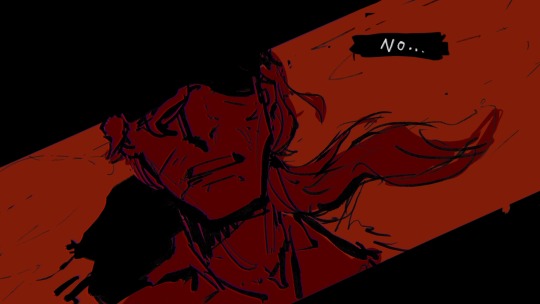
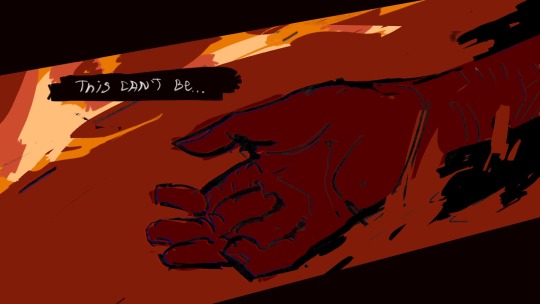
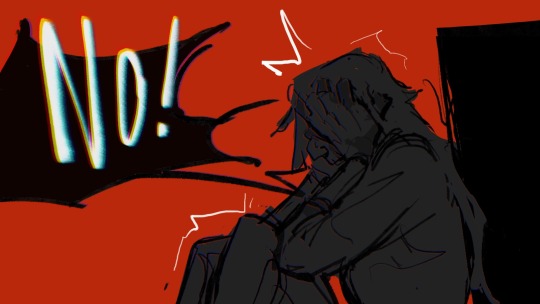
Previous | start
Please don't question why some pages are not drawn and one page looks completely different than the others-
I just gave upXDDD
if you like what I'm doing and would like to support me here's my kofi and patreon!
#Toh#belos#at the dawn of the light#comic#philip whittebane#de aged philip#In a cursed way#the owl house#emperor belos#Because we can
522 notes
·
View notes
Text
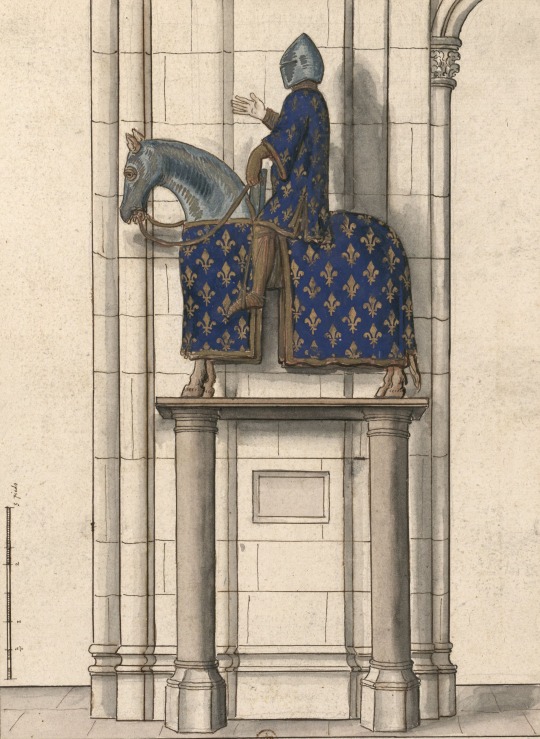
Equestrian statue of Philip IV, King of France in Notre-Dame Cathedral, destroyed between 1792 and 1794.
#philip iv#king of france#equestrian#statue#armour#royalty#king#nobility#french#france#medieval#middle ages#ancien régime#notre dame de paris#cathedral#paris#notre dame#history#art#europe#european#kings#mediaeval#kingdom of france#royal#royals#war horse#destrier#fleur de lis#heraldry
270 notes
·
View notes
Text

send them to the moon. both of them.
#middle aged men as mlp characters#fucking idiots#gta#gta v#gta 5#art#fanart#gta art#trevor philips#michael de santa#trikey#mlp#my little pony
146 notes
·
View notes
Text
something about michael saying he wants trevor to be happy.. ☹️🤍
#gta v#trevor philips#michael de santa#trikey#middle aged man yaoi#help i love them#they make me ill#i love old man yaoi
74 notes
·
View notes
Text
@takoyaki-ball thanks for appreciating, although I've committed a horrible crime to make this happen

Mikey suddenly got jealous and there was no way I could prevent it
((not proud of that))
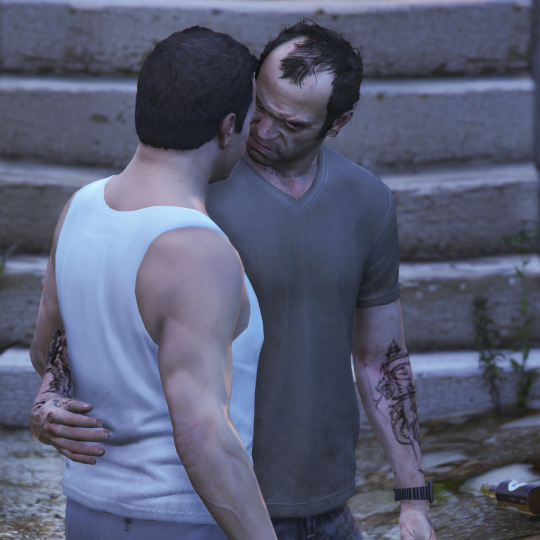
#let's go cupcake#cmon make me suffer#sorry Patricia#I really love you but whatever happened happened#gay screenshots require sacrifices#gta 5#gta v#trikey#mad michael de santa#indifferent trevor philips#poor patricia madrazo#yandere middle-aged man#unjustified violence#jealousy issues#no regrets ngl
117 notes
·
View notes
Text
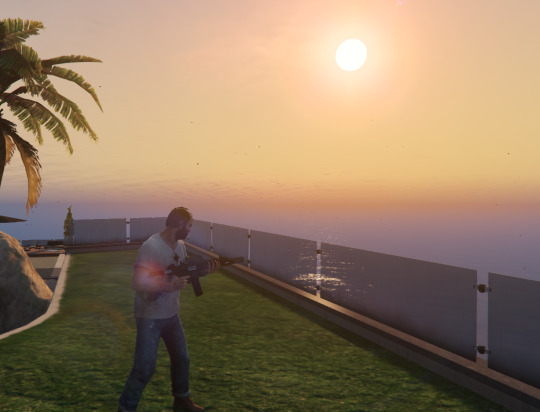

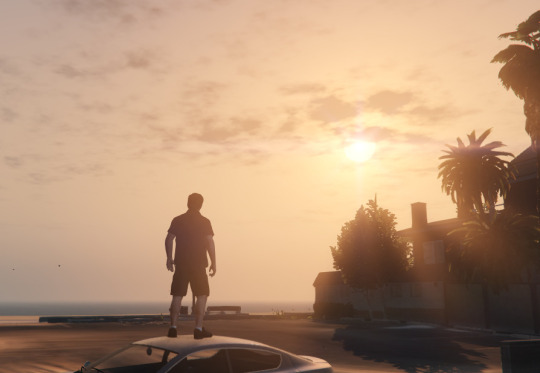
Sunset
#Had these sitting in my drafts for ages#trevor philips#michael de santa#michael townley#gta v#gta pics#gof’s post#type: photo#grand theft auto five#grand theft auto#tw guns#Post 74
8 notes
·
View notes
Note
28 with trikey 👀 👀
Consciousness. Rough cement under his cheek, the taste of blood, fabric gagging his mouth.
Complete darkness when he opened his eyes, hands and feet not moving an inch, body too weak to fight against the ropes.
So someone had got to him. Whatever. He didn't remember who or why but he'd kill anyone who stood in his way. If they dreamed he'd go down this easily, they were gravely mistaken.
Or so he thought until he heard Michael screaming in pain, somewhere too far away — and all he could do was shout his name against the gag, voice muffled and soon hoarse with all the effort to make them stop, or to even let Michael know he wasn't alone, but there was no reaction, he couldn’t help at all, couldn’t break free and escape, couldn’t not sob and drool over his blindfold and gag until there was nothing left to give.
Hours or days or weeks passed by before Michael went horribly quiet, and only then someone came to him. He struggled as a combat boot nearly crushed his cheek, but he didn’t care what would happen to him, he just needed to know if Michael was still—
"Hello, brother."
#I did the first one so fast but then this took ages I'm sorryyyy :“”)))#I didn't know how to write this at first but then it just came to me. I just couldn't do forced to watch but listening is just as bad imo#my fics#trikey#trikey fanfiction#gta fanfiction#tw: torture#trevor philips#michael townley#North Yankton era#Let's just say Trevor has enemies#michael/trevor#michael de santa
15 notes
·
View notes
Text
The Age of Louis XIV

Voltaire, who wrote Le sciècle de Louis XIV (The Age of Louis XIV), started off by doing a recount of the states of Europe before Louis XIV. and my hetalia brain rot began to go wild so i figure this can help me understand the first chapter of the book better so I sorted out quotes and made a brief summary for each mentioned nation in order that is written in the book to help enforce my understanding.
Germany*
*- "Germany" refers to the Empire of Germany, known in history as the Holy Roman Empire; since the 15th century, its throne had been occupied by the Habsburgs

"...the most powerful neighbor which France has...it abounds more with sturdy men inured to labor." "this great Germanic body...is maintained in [... ] order and regularity [...] The difference of government and genius makes...the Germans [more proper] for acting on the defensive."
Summary: strong, divided into two parties by Christianity. Emperor has less power in compare to a King in France. Was at the time pretty poor despite being "rich at home", and would eventually see its flourishing later on.
Spain
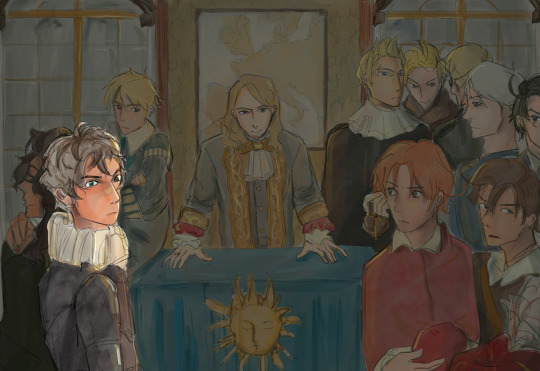
"...more formidable to Europe than the Germanic Empire. The kings of Spain were infinitely more absolute and rich than emperors..." "[Spain] under Philip II became a vast body without substance, which had more reputation than real strength...Notwithstanding all these disadvantages, Spain, by being united to the empire, threw a very formidable weight into the balance of Europe."
Summary: strong #2, starting to see its weak points, but still a ringing force and surviving well with the colonies.
Portugal
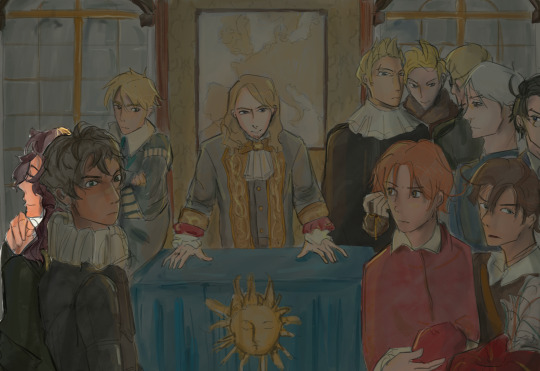
"...Portugal was again made a kingdom...through necessity, cultivated trades...entered into a league with the French and Dutch against Spain." "Portugal...extended its trade, and augmented its power..."
Summary: doing well over there. Shall watch your career with great interest.
The United Provinces
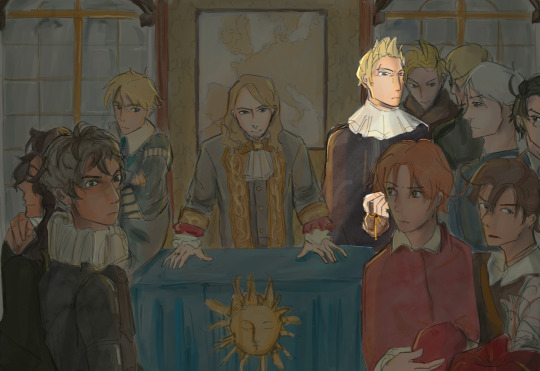
"...almost the only example in the world of what may be done by the love of liberty and unwearied labor. There poor people...made head against the whole collected force of their master and tyrant...and founded a power which we have seen counterbalancing that of Spain itself." "...they established a form of government which preserves...equality, the most natural right of human kind."
Summary: quite an admirable force (don't mess with the Dutch's money bags™️). Good government.
England
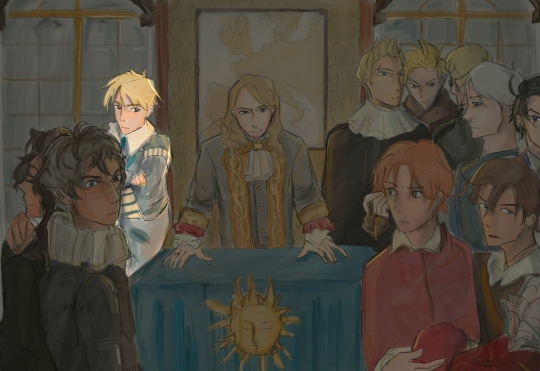
"England...arrogated to itself the sovereignty of the seas, and pretended to preserve a balance between the powers of Europe." "This civil war...[made England] lost [...] credit in Europe...trade was obstructed, and other nations looked upon [England]...till the time that she at once became more formidable than ever, under the rule of Cromwell."
Summary: pirate arc of England sprouting. Charles I could do well in anything but being a king ("ill-advised prince"). Waiting for Cromwell to do his thing.
Rome/The rest of Italy
I merged these two parts together for ✨aesthetics✨
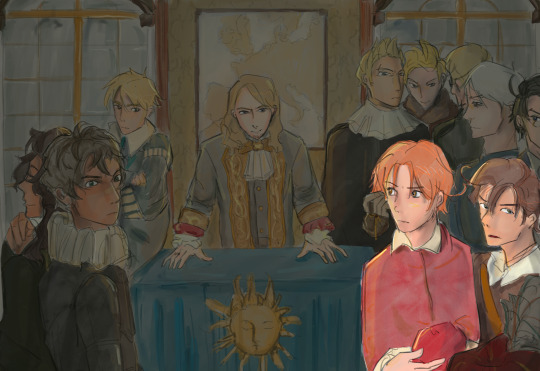
"[Rome] has very little trade or money. [Rome's] spiritual authority...is slighted and abhorred by one half of Christendom...yet [...] some [...] resist [Rome's] will at times with reason and success." "but [the privileges] of Rome, by an almost constant proper use of resolution and concession, has preserved all that was humanly possible for her to preserve." "Some rights, many pretensions, patience and politics are all that Rome has left now of that ancient power..."
Summary: typical pope behavior, but in reality was losing respect and control. Impressively that was dealt with seasoned insight, and different oppositions of different kings/emperors were met with different levels of defense ("submissive...terrible to..acting cunningly"). Sly old fox, if you will.
"...situated in a peaceble country...biassed by various interests." "The state of Florence enjoyed tranquility and abundance under [...] Medici; and literature, arts, and politeness [...] still flourished there."
Summary: the typical Renaissance still doing the thing. Less disturbed by conflicts compared to the northern parts.
The Northern Kingdoms
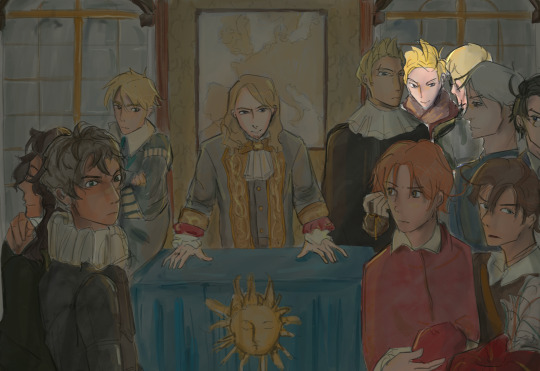
"The Swedes [...] were a freer nation by their constitution which admits even the lowest class of the people into the assembly of the general estates." "Denmark...was no longer so [formidable] to any power."
Summary: Sweden good. Denmark flopping a bit. The rest of the northern kingdoms were doing their best (fighting)
The Turks

"The seraglio, though corrupted by effeminacy, still retained its cruelty...when it had [recovered from wars], this empire became again formidable."
Summary: may look messy back home but still don't underestimate the power
The situation of France

"France [...] was in alliance with Sweden, Holland, Savoy and Portugal...was engaged in a war against the empire of Spain...The French there has done the Spaniards and Germans a great deal of mischief, and had suffered as much themselves."
Summary: fighting with Spain (and also the house of Austria, so also Germany), tho the battles has reduced to petty squabbles over "a few frontier towns". Richelieu came to raise tax.
---
Works cited The Works of Voltaire. A Contemporary Version. A Critique and Biography by John Morley, notes by Tobias Smollett, trans. William F. Fleming (New York: E.R. DuMont, 1901). In 21 vols. Vol. XII.
--- Rambling (just a little) time.
Okay first off, bear in mind that all the quotes and summarized content are from the pov of Voltaire, so there can be possible biases.
I've been invested in the reign of Louis XIV for quite a while now, and I can attribute the reasons to 1) BBC Versailles, 2) Molière, and 3) general liking to history at the time (17-18c). I'm trying to figure out what exactly that the time period attracted me so much, like what "vibe" what "ideal" etc, but I'm still trying. And reading that book, which is long as hell, not to mention the messy af™️ European drama and people having Too Similar Names may just be helpful in terms of getting to know the history that happened in and around the court of Louis XIV.
Welp, gotta read more if I want to know more.
#hetalia#aph#historical hetalia#i will be lazy and not tag everyone sorry not sorry#doodle dump#random otter rattles#history
201 notes
·
View notes
Text
Black Jack is in da house
I had promised you this short, but interesting answer from Tobias' Saturday morning panel, at the Landcon and it was impossible to post it from my phone (& took forever to transfer to my laptop, go figure):
The fan's question was about the relationship between the OL cast ('the whole cast', it was underlined - an Anti, for sure, they always dilute the real focus and then spin off the story at their convenience) while shooting Season 1 in Scotland. I think Rostercon's AI-generated lazy summing up that was taken for the Bible by some people (who were not in that room, but always have the nerve to lecture others) does not reflect at all what Tobias Menzies really said.
Here is the AI-generated summing-up of the above answer, in its original French version:

[Source: Outlander : revivez la première journée de la Land Con 7 - Roster Con]
My translation: 'Tobias has excellent memories of shooting Outlander; it was a real collaborative effort. He adds that they all learned from each other.'
Here is my transcript of the clip:
'Well, I mean, I'd like to think that I taught them all that they know. No, I mean it was an interesting job in that we all started it together, um, we didn't really know what the show was, we were off in the wilds of Scotland, no one really cared, we were making it... [sorry, I could not get that bit at all, perhaps a native speaker could and thank you] I mean, nobody knew that book and it was a sort of element to it, that it wasn't a big deal, it wasn't a big show. And so, there was a kind of freedom in that. Yeah, and I think we... we needed each other to work out how to tell the story in an exciting and interesting way, how to adapt the books, what.. yeah... how to...what the performance style almost was, to discover the show. And that was also with the show runners and the directors and all of the actors, we were kind of holding it together, working out what this show is and how we bring these books to life. And yeah, so we'd be all learning a lot from each other in that way. It was very collaborative, it was a great, very happy couple of years. [clapping, yelling, etc.]'
You'll agree with me that the sanitized version could never compare with the above verbatim, which is chock a block full with carefully calibrated, but very telling, nuances.
And now, for my own, eyewitness thoughts, you are totally free to agree or disagree with:
Tobias Menzies was never my OL favorite, which is perhaps testimony to his spectacular portrayal of the Black Jack/Frank Randall dynamic duo of sorts. Instead, I absolutely loved (loved, loved, loved....) his Prince Philip, in The Crown: spot on, subtle and boy, bringing to life a beloved (if somewhat controversial) Royal was everything but a piece of cake. He is also a very intelligent, well-read man, one could never accuse of speaking in tongues or in his sleep, while engaging with the press or the fandom. As such, once you peel off the layers of compulsory Narrative bullshit and the first line of pure British, self-deprecating banter, things become interesting.
Of course, he just had to pay lip service to the long negotiated talking points. Namely, that shooting Season 1 in the Scottish Highlands was doubled by a double sense of remoteness and uncertainty about the show's success. That said, he adds to it two interesting elements: that nobody knew anything about Gabaldon's body of work and that 'no one really cared', without further specifying. And I think this is true.
Speaking of which, 'Erself's American worshippers might perhaps want to take off their rose-tinted glasses and realize two things. First of all, their goddess was (and perhaps still is) a literary C-lister on the European fantasy book market, where people like Marion Zimmer Bradley, Robin Hobb, George R.R. Martin or Guy Gavriel Kay - ironically, all of them from North America - are real powerhouses, who have been enjoying a cult following for ages, even before or without a TV adaptation. But Gabaldon was nowhere important to be found, before the series started to be included on our own cable networks' offer. It is still considered as niche, even as the series has never left our Netflix offer. Second thing, in this particular context, I am pretty confident that 'nobody cared' relates both to the cast and crew's relaxed attitude on set, but also to the people's general live and let live attitude, which, I am told, still endures to this day. The stalking, the barking, the shouting and the swooning have started in the USA and crossed the pond in earnest only when the American Stans began to hit the road and make the pilgrimage to GLA.
Confirmation that it is so is another reference by the same Tobias Menzies, in the same answer: 'there was a kind of freedom in that'. Freedom: what a peculiar term, isn't it? Freedom of adaptation? That was not the impression Season 1 gave me, after reading the book. Freedom of being themselves and acting accordingly? That's more down my alley. It might even suggest that, after Season 1 wrapped (September 24, 2014), this blessed, innocent age gradually came to an end, as the show gained more and more traction, momentum and press attention.
I also deeply appreciated his honesty, when talking emphatically about starting 'it together' or needing each other and learning a lot from each other. There was no Tobias & C vs. The Peasant and the Rest of the World on that set, as some retconning theories would like you to believe. These people were actors embarking on a project which, for some, was about to become life-changing. I doubt scheming and power games and competition were on their already overflowing plates. Alas. Those tone-deaf allegations are not going anywhere, any time soon, I am afraid.
But here's more: 'it was a great, very happy couple of years'. The question specifically covered Season 1 only, not Tobias' entire Outlander shooting experience, which he chose to address, anyways. But mentioning a 'very happy couple of years' is strange, because his presence on set and involvement with the OL project was longer than that. Let's do the math:
Season 1 started filming on October 7, 2013 and wrapped on September 24, 2014.
Season 2 started filming on May 7, 2015 and wrapped on February 27, 2016.
Season 3 started filming on August 21, 2016 and wrapped on June 17, 2017. We know that the South African part was shot from March to June 2017 and the rest from August 2016 to somewhere before March 2017. Frank Randall dies at the end of the third episode (All Debts Paid), which was probably filmed before March 2017 - that was way before my time here, so please correct me if I am wrong.
That is covering almost four, not two years, on any given timeline. However, the Interview From Hell happened in January 2016, roughly two years and four months after the shooting started. And it was the first big blow to what probably used to be a happy-go-lucky SC Love Fest. Should we understand that the atmosphere on set ceased to be 'very happy' after the first couple of years? By the time IFH happened, they were still shooting Season 2, after all. I believe it had consequences and I also believe we are witnessing these consequences even today. What we do know is that increasingly paranoid non disclosure measures were taken, in order to make sure no unfiltered information would ever reach the outside world.
I am, of course, merely speculating, in this particular case. But the timeline incongruity, by one of the leads, who is also a very precise man when it comes to words, gave me pause.
I rest my case.
PS: sorry for the 'fuck off' interjection right in the middle of the clip. I was really, really annoyed by the unnecessary shuffling between rows and tried to focus on Menzies.
104 notes
·
View notes
Text
favourite poems of july
knar gavin strindberg grey
dahlia ravikovitch the love of an orange (tr. chana bloch)
danez smith summer, somewhere
hannah gamble your invitation to a modest breakfast: “your invitation to a modest breakfast”
claire schwartz lecture on the history of the house
joseph brodsky collected poems in english, 1972-1999: “a part of speech”
ralph angel twice removed: “alpine wedding”
bob hicok insomnia diary: “spirit ditty of no fax-line dial tone”
caleb klaces language is her caravan
philip good & bernadette mayer alternating lunes
hester knibbe light-years (tr. jacquelyn pope)
tracy k. smith life on mars: “the universe as primal scream”
rigoberto gonzález other fugitives and other strangers: “the strangers who find me in the woods”
stephen edgar murray dreaming
james schuyler other flowers: uncollected poems: “light night”
amy beeder because our waiters are hopeless romantics
diane seuss backyard song
tomás q. morín love train
safiya sinclair the art of unselfing
carol muske-dukes skylight: “the invention of cuisine”
peter gizzi the outernationale: “vincent, homesick for the land of pictures”
william matthews selected poems and translations, 1969-1991: “onions”
c.k. williams butcher
mark mccloskey the smell of the woods
jennifer chang the age of unreason
richard blanco city of a hundred fires: “contemplations at the virgin de la caridad cafeteria, inc.”
bob hicock the pregnancy of words
j. allyn rosser impromptu
carl phillips then the war
stephanie young ursula or university: “essay”
gloria e. anzaldúa the new speakers
kofi
#tbr#knar gavin#strindberg grey#strindberg gray#dahlia ravikovitch#the love of an orange#chana bioch#danez smith#summer somewhere#hannah gamble#your invitation to a modern breakfast#claire schwartz#lecture on the history of the house#joseph brodsky#collected poems in english#a part of speech#collected poems in english 1972-1999#ralph angel#twice removed#alpine wedding#bob hicock#insomnia diary#spirit ditty of no-fax dial tone#caleb klaces#language is her caravan#philip good#alternating lunes#bernadette mayer#hester knibble#light-years
806 notes
·
View notes
Text
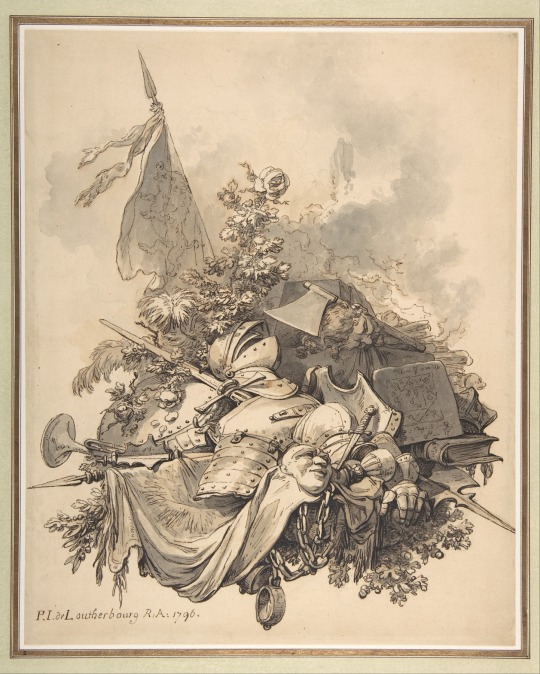
The House of York by Philip James de Loutherbourg
#philip james de loutherbourg#art#house of york#house of plantagenet#kingdom of england#history#england#english#royalty#nobility#monarchy#medieval#middle ages#wars of the roses
147 notes
·
View notes
Text
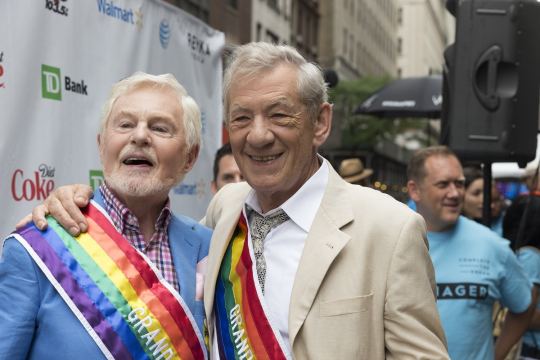
Jacobi and McKellen as grand marshals of New York City's 2015 pride march.
All Good Omens (show) fans will know Derek Jacobi as the Metatron. His brief role on Doctor Who is also getting a lot of mention in recent posts, but I'm not going to talk about any of that.
Like his Vicious co-star Ian McKellen, Jacobi has had a long and illustrious career in theatre, television, and film. McKellen and Jacobi met when they were at Cambridge.
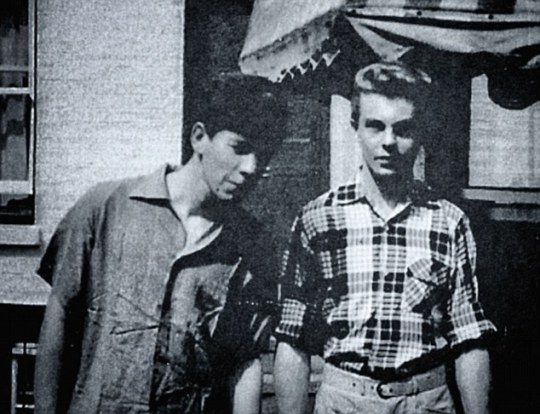
I'm not a huge fan of the Daily Mail, but this article, an interview with the two actors, is quite interesting. I'll just quote this part:
Jacobi says he came out to his mother when he was at university. ‘She said, “All young men, go through this phase, don’t worry.” I remember saying, “Don’t tell Dad.”’ He doesn’t know to this day if she did. ‘I think she did, but I don’t know. But they were wonderful, my parents, not much was said but they kind of knew, they got it.’
McKellen hasn’t heard his friend talk of this before. ‘That’s the first time I’ve heard that,’ he says, genuinely moved. ‘I never came out to my family. Biggest regret of my life.’ It turns out he didn’t even come out to Derek at university, even though it’s always been reported that he had something of a crush on him.
‘Yes, I did fancy Derek, but I didn’t act on it, God, no. It was illegal, remember. I do get on my high horse about it, because it was so difficult. There were no gay clubs you could go to. No gay bars, no gay newspaper, nothing. What there was was a bit sleazy, I suspect. One of the reasons I became an actor was that you could meet gay people. Even then everything was difficult. When you went to America they asked, “Are you now, or have you ever been, homosexual?” I lied on the form. It was a different world.’
I want to talk about Vicious for a bit, the ITV britcom in which Derek Jacobi and Ian McKellen play an aging gay couple, (respectively) a homemaker, Stuart Bixby, and an actor, Freddie Thornhill, for fourteen episodes.
Freddie (McKellen) tells Stuart (Jacobi) about a part he's hoping to get.
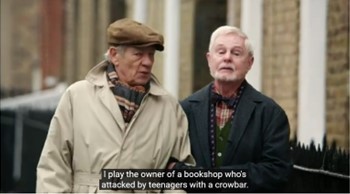
I had to add these for the Broadchurch reference.
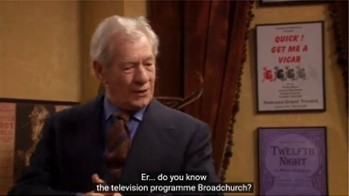
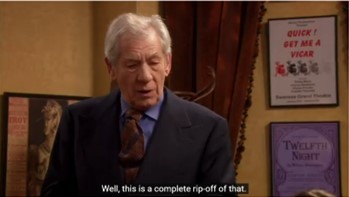
It's a law that British actors of a certain age play this part.
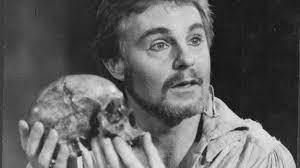
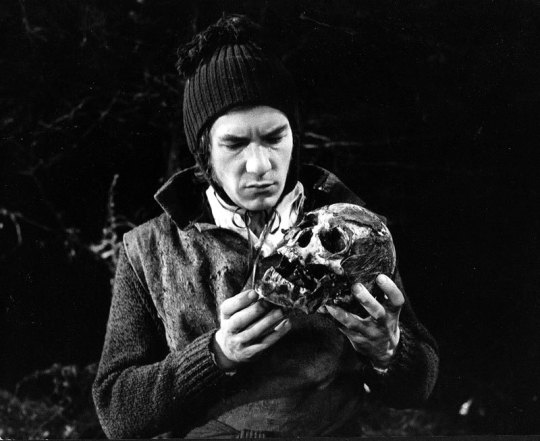
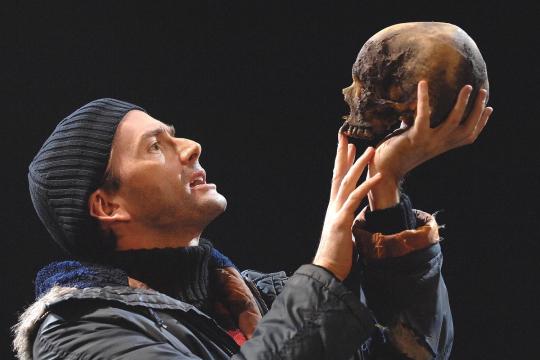
I couldn't find one with Michael Sheen and the skull, but here he is in the role.
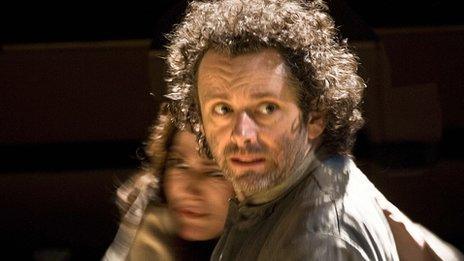
McKellen did the part again at 81 in an age-blind production.
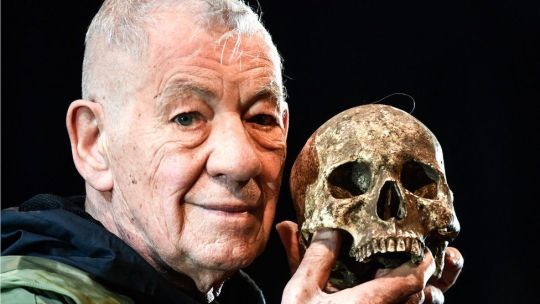
Jacobi's big breakout was the titular role in I, Claudius on the BBC in 1976.
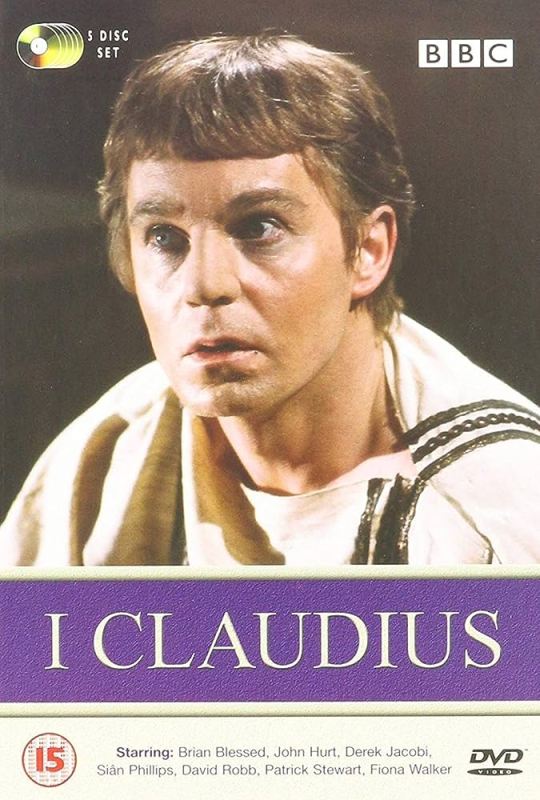
In the '90s, Jacobi played amateur sleuth and 12th century monk, Brother Cadfael on the ITV series.
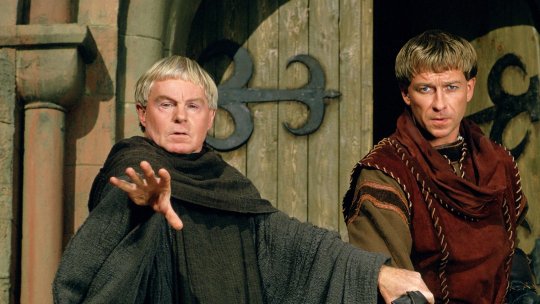
I had watched some of Vicious before, but, spurred on by Jacobi's reappearance on Good Omens, looked for it again and watched both seasons a couple of weeks ago. Because I love a good fancast and Jacobi and Sheen (at least as Aziraphale) remind me a little of each other, I couldn't help but think that Jacobi and McKellen in their youth could have played a version of Aziraphale and Crowley. (There have been a couple of posts noting this about Jacobi, and that he might have been up for the part if it had been done soon after the book came out.)
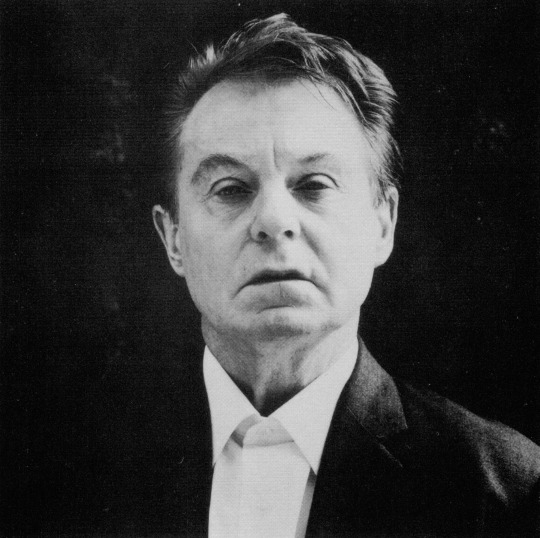

Jacobi, left, and McKellen, right (obviously).
I also think that Tennant and Sheen could have pulled off playing Freddie and Stuart in a flashback.
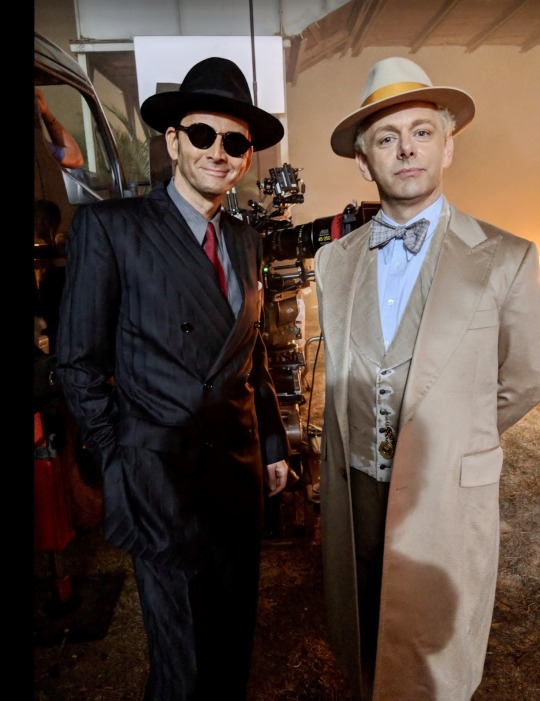
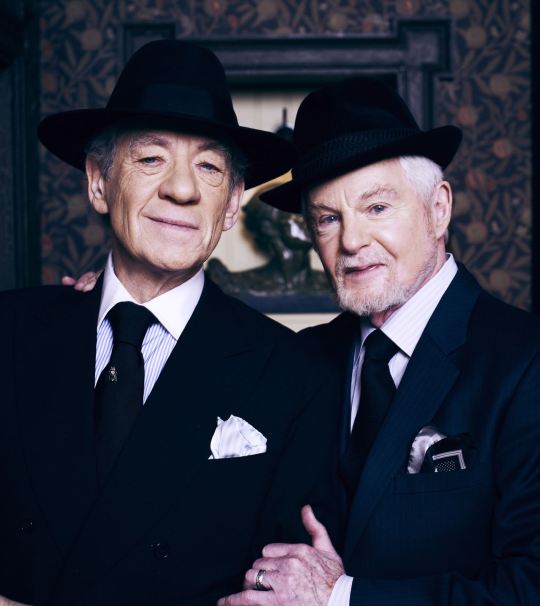
An even younger version of Freddie and Stuart does appear in the series, however, played by Luke Treadaway and Samuel Barnett.
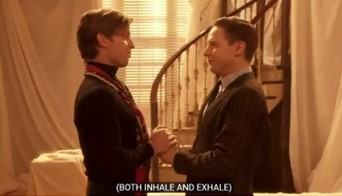
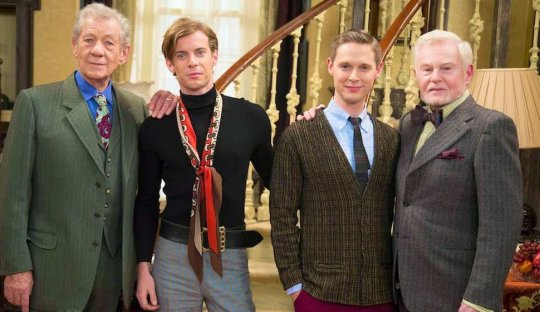
Also good casting! They do a great job playing McKellen and Jacobi playing Freddie and Stuart.
Shoutout to this post by @ember-knights, that suggested Good Omens fans should check out Vicious for a glimpse of what life in the South Downs cottage might be. And also to other posts mentioning Vicious and Good Omens in the same breath, as well as comparing Sheen and Tennant to Jacobi and McKellen (which I probably reblogged but can't find right now).
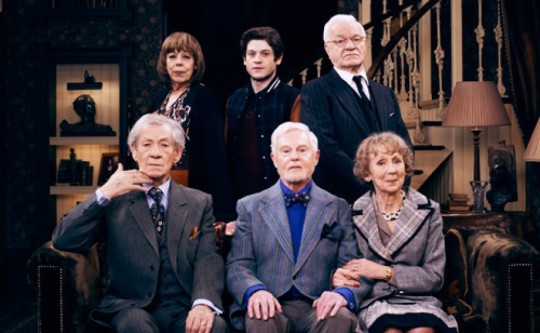
Cast of Vicious: Frances de la Tour, Iwan Rheon, Philip Voss, Ian McKellen, Derek Jacobi, Marcia Warren (Wikipedia). (Yes, the upstairs neighbor (Rheon) does go on to play Ramsay Bolton on Game of Thrones. He's a sweetheart in this, though.)
Now, I don't think Crowley and Aziraphale are the same as Freddie and Stuart, by any means. Freddie and Stuart say quite cruel things to each other. The characters become deeper in the second season; it’s a little sweeter than the first. I enjoy the bitterness of the first season too, though. It is funny, and Good Omens fans may enjoy watching it if only to see Derek Jacobi (who plays the Metatron) in a comedy role and a role that's sympathetic, especially if they are not familiar with his large and impressive body of work.
I don't think Aziraphale and Crowley's life in the bookshop as a couple, not just a group of two, or life on the South Downs, would be exactly like this, but there are somehow some similarities that I don't even know how to begin to pinpoint or explicate.
Crowley and Aziraphale’s affection is always so palpable and that’s not always clear with Freddie and Stuart. Crowley and Aziraphale are so loving that, even when they're bickering, it's joyful, even when they're arguing, even when they're coming apart (temporarily) at the seams, their love is undeniable. I don’t even think their breakup was toxic; although they were desperate at that point and hurt each other badly, it wasn't what they wanted. Sometimes it's that way.
And, lest I'm putting you off Vicious here, the Ineffable Husbands are a high bar as love stories go, but you will get to see some love and affection between Freddie and Stuart too, and I'd really love to see these actors work together more. (I am happy with how the show ends up, by the way.)
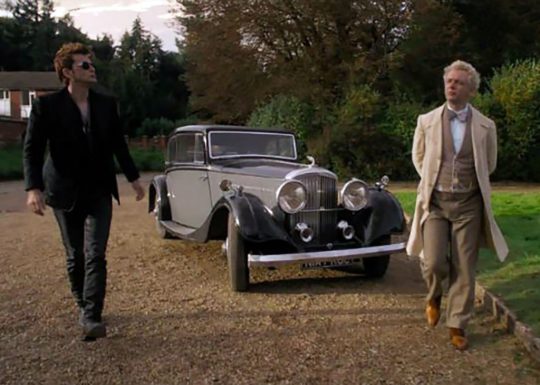
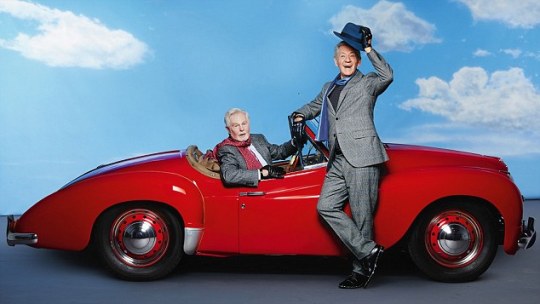
Toodle-loo! Hope everything is tickety-boo with you.
#Good Omens spoilers#Good Omens#Good Omens viewpoints#Derek Jacobi#Ian McKellen#Vicious#Derek Jacobi appreciation post#***Good Omens#tickety boo
516 notes
·
View notes
Text
Nigel's Book Details: Spread Four
Using the order in which each spread is presented in the scene where Alex finally reads through Nigel's book, this is the fourth spread.
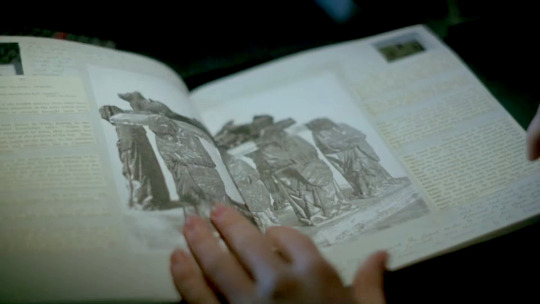
Text
Sadly, this is yet another spread wherein the text excerpts and the handwritten notes remain illegible even with sharpening/image filtering.
Central Image: Tomb of Philippe Pot
This spread is dominated by one large image across both pages. Despite the awkward angle and distortion from running across the gutter between pages, it was actually fairly easy to identify this image with the right search terms.
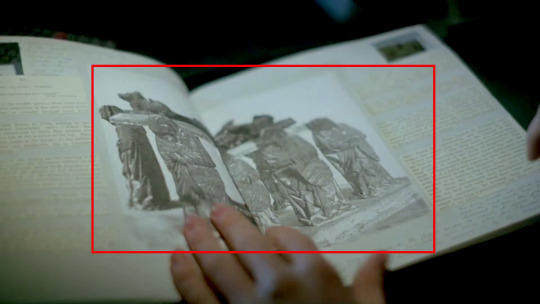
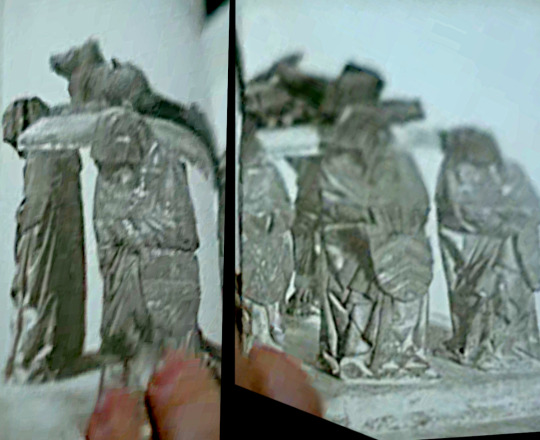
This is an old photograph of the tomb of Philippe Pot, a funerary monument currently housed in the Louvre. It was commissioned around 1480 by Philippe, some 13 years before his death. It represents the Burgundian style popular at the time, with 8 mourners serving as pallbearers holding up an effigy of Philippe, carved from limestone and painted and gilded.
Philippe Pot
Philippe was a scholar and bibliophile, raised at the court of the Dukes of Burgundy, a powerful political state at the time. He was made a knight of the Order of the Golden Fleece, a chivalric order founded by Duke Philip the Good. This honor was stripped from him when he defected to serve King Louis XI of France, later brokering a truce between the two warring states, and he was appointed seneschal of Burgundy by King Louis.
The Monument
Philippe was buried at Citeaux Abbey, in the chapel of Saint-Jean-Baptiste. During the French Revolution, all church property was claimed by the state, and it was first relocated to another abbey and then purchased by a private owner to decorate his garden. It was moved and sold a few more times before being acquired by the Louvre in 1889. It was cleaned and restored a few times after this photograph was taken, and its current appearance can be seen below.
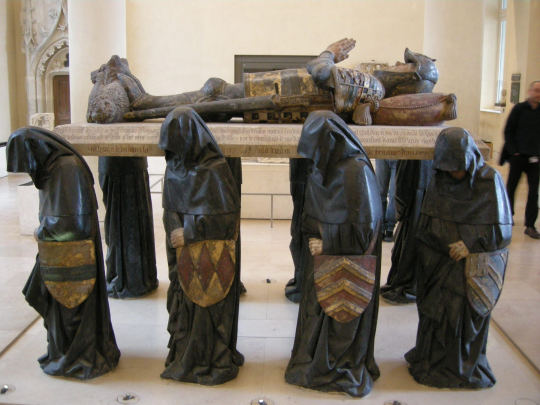
The mourners, called "pleurants", each bear a painted and gilded heraldic shield that refers to specific members of Pot's lineage, indicating the monument is of the "kinship tomb" type. The four shields on the left represent the heraldries of Guillaume III Pot (d. c. 1390) and Raguenonde Guénant, the Cortiambles family, the Anguissola family, and the de Blaisy family. Those on the left represent the de Montagus and de Nesles, and two unidentified families.
The Gothic script inscriptions around the edges of the platform recount the deeds of Philippe and explain his reasons for switching sides.
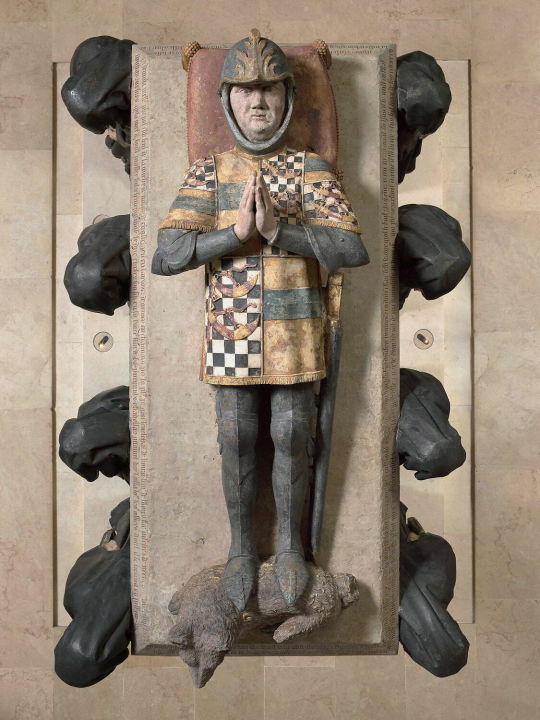
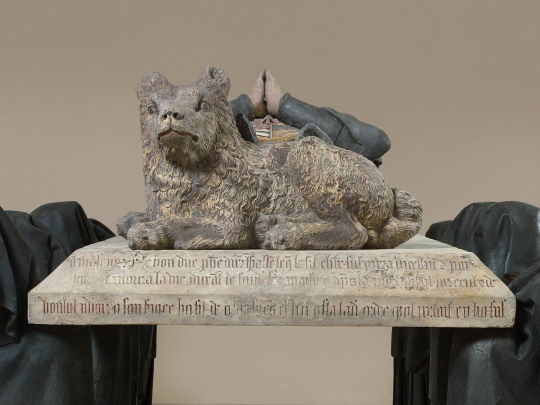
The animal at the feet of the effigy was poorly restored by prior generations resulting in loss of some detail. Historians disagree on whether it was meant to represent a lion or a dog but many see it as a dog, a popular symbol of loyalty in Burgundian tomb art.
I think I'll call him Luther.
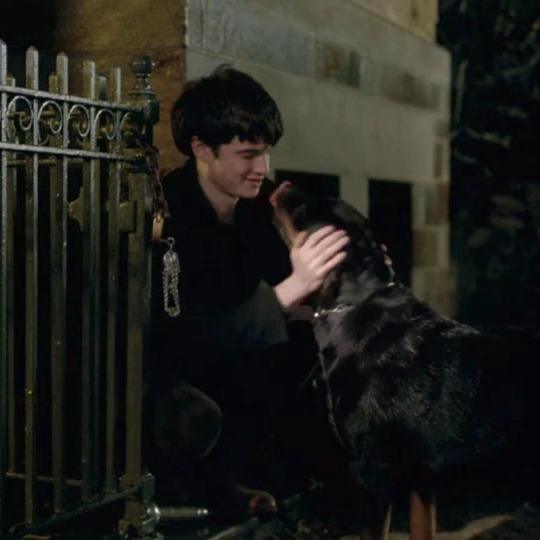
Further reading: The Order of the Golden Fleece
Another organization founded in the late Middle Ages, but not a monastic order like the Templars. This order still exists today in two separate branches. The Spanish order has become an order of merit of the state, while the Austrian order has remained a Catholic chivalric order and is recognised even by the Republic of Austria as an international legal entity. Considered to be a highly prestigious honor even today.
My research has dredged up no particular historical association between this order and anything involving Templars or Freemasons other than the mere fact that both the Templars and the Golden Fleece were knightly organizations. I also find no connection between Philippe Pot and the Templars. Based on that, I think the photo of this tomb was included purely for the aesthetics--the medieval character, the heraldic shields, the effigy of a knight are all meant to evoke the idea of Templars without actually being tied to them.
[Nigel's Book Details: Spread One] [Nigel's Book Details: Spread Two] [Like Minds Masterpost]
#due to difficulty identifying some images i am choosing to proceed with the spreads I CAN do rather than#try to complete each spread in order#basically: spread 3 is giving me fits so we're moving on for now#like minds#nigel colbie#alex forbes#tom sturridge#murderous intent#like minds 2006#like minds analysis#like minds annotations
31 notes
·
View notes
Text
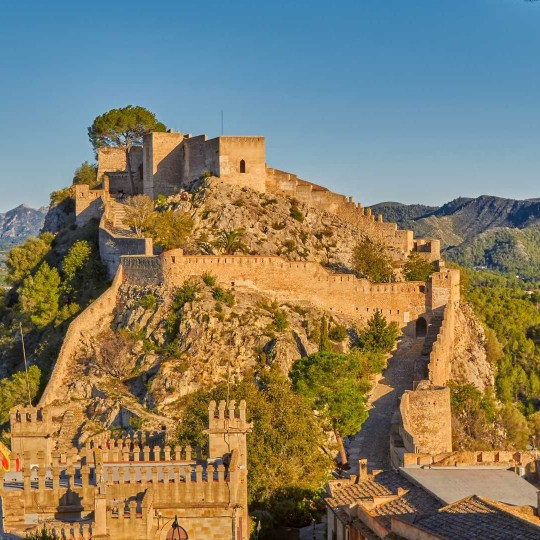
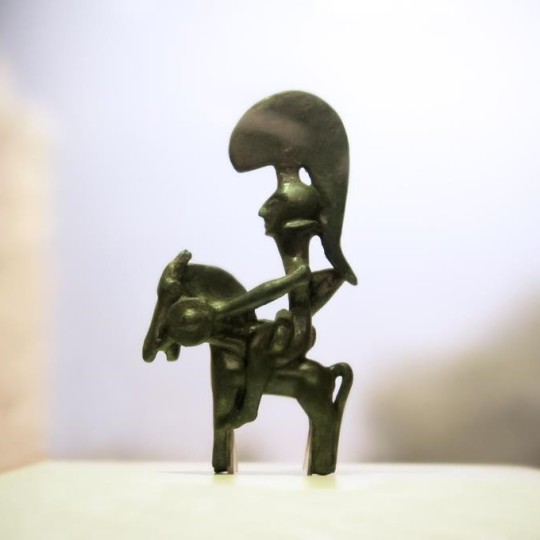
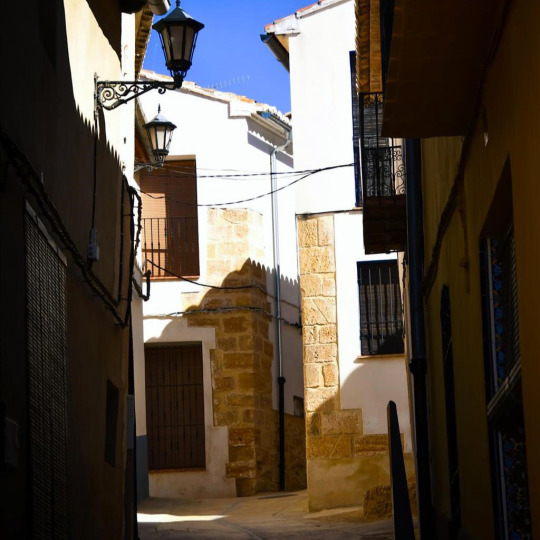

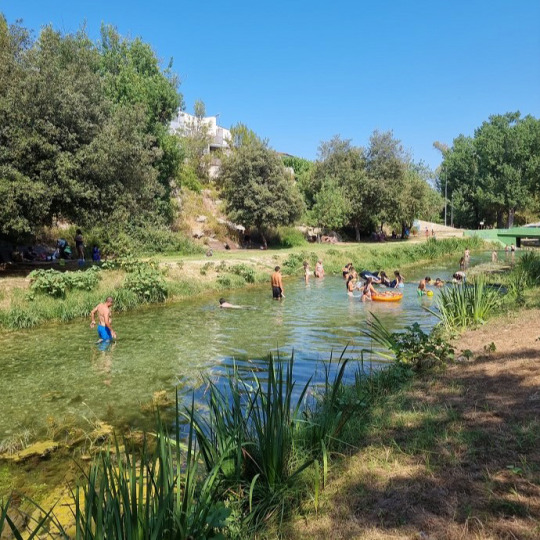
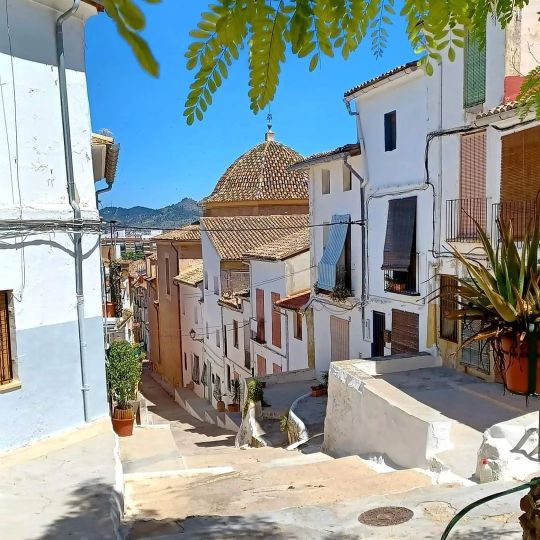
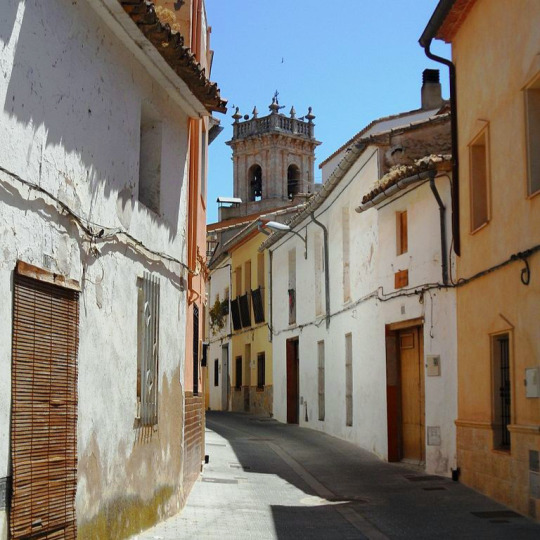
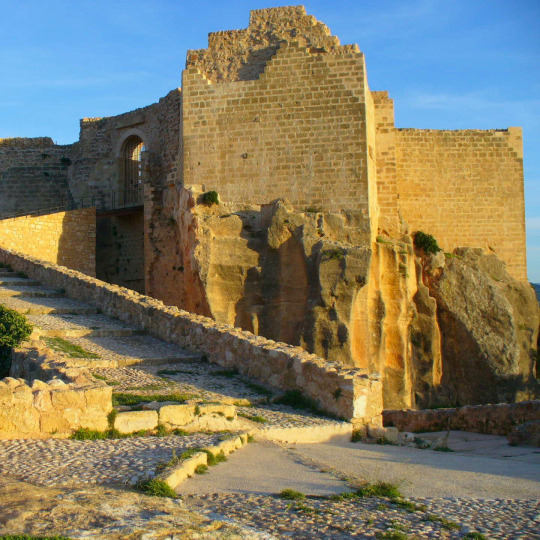
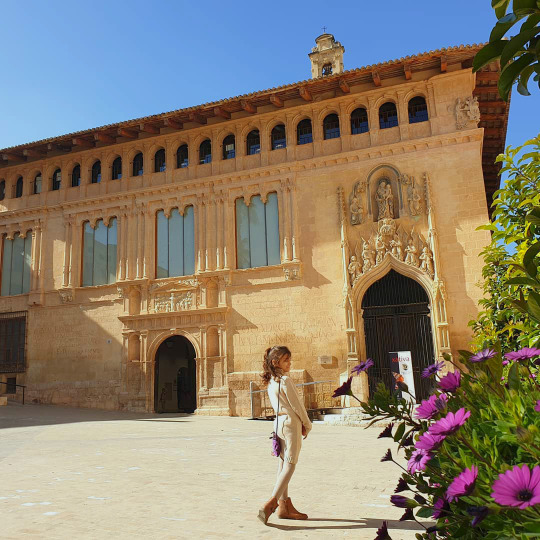
De Salses a Guardamar i de Fraga a l’Alguer: les comarques de parla catalana una a una. 65/88: la Costera (Central Valencian Country).
La Costera is a shire whose capital city is Xàtiva.
The inhabitants of Xàtiva are known with the nickname "socarrats" (which means "burned"). Xàtiva had been the main city in this area for a very long time, it had officially been given the title of city in the year 1347 and by the 1700s it was the second most populated city in all the Kingdom of València (second only to València itself). But its inhabitants had to face a particular cruelty from king Philip V.
During the War of the Spanish Succession (1701-1715), the Castillian (Spanish) army militarily occupied the Kingdoms of València, Aragon, Catalonia, and Mallorca. The invader king, Philip V, ended their independence and incorporated them by "right of conquest" to Spain, abolishing their historical forms of government and historical laws, forbidding the use of the Catalan-Valencian language in all official settings, imposing the use of Spanish, forbid many of our culture's holidays, closed down universities, publicly executed thousands and inflicted public humiliations and exile on more, and imposed extremely high taxes to pay for their homeland's militarization. At that moment, the Spanish army started a period that historians have labelled "military terrorism", where they did everything in their hand to impose a state of terror and psychological punishment on the conquered population. Among the punishments, there were massacres, mass deportations, and public torture. More than 30 Catalan towns and cities were burned to the ground, the larger of which was Xàtiva.
The people of Xàtiva had resisted the advancement of the Bourbon army (the Castillian and French armies) but in the end they couldn't resist the much superior artillery brought from France. As a punishment for their resistance, the whole city was set on fire and burned to the ground, the city's name was changed from Xàtiva to the Spanish name "Nueva Colonia de San Felipe" ("New Colony of Saint Philip"), many of its inhabitants were killed and had all their belongings taken (they were sentenced to death without a trial; the Spanish army even killed 73 people -many of whom were women and children- who were praying in a church all at once) and more than 300 Xativan families were deported to Castilla-La Mancha (Spain). Philip V's orders were: "demolish all of Xàtiva, don't leave any building standing, not even the churches". They also destroyed all the literary and artistic works as well as historical documents that were made by these people he considered rebels. Instead, they built a monument "designed to commemorate the future ages of the chastisement of rebellious people".
The fire that consumed this big city and burned it to the ground, an event amplified by the Spanish Bourbonic propaganda as a way of saying "look what happens to rebels: submit and don't dare to try any resistance", has remained in the memory of the people of this area. For this reason, the inhabitants of Xàtiva are still jokingly called "burned ones". This is referenced in the iconic Valencian traditional song Malaguenya de Barxeta, with the line "I come from the heart of the Costera, the town of the burned ones, where my Valencian Country is reborn from the ashes" (vinc del cor de la Costera / del poble dels socarrats. / D'allà on renaix de les cendres / el meu País Valencià.)
Besides the tragic history of the Xàtiva Extermination, the Costera shire has many more historical sites. It's also interesting to highlight the Montesa castle, built by the Order of Montesa (the successors of the Knights Templar); as well as the Ancient Iberian site of La Bastida de les Alcusses (5th-4th centuries BC).
Photos from Comunitat Valenciana, Turisme La Costera, Arroz Dacsa, Valencia Bonita, munozmontell/xativafotosoficial, ninosenmochila, Enrique Íñiguez Rodríguez/Wikimedia. More information about Xàtiva's destruction can be found in this article (in Spanish).
#comarques#la costera#país valencià#xàtiva#història#guerra de successió#history#war of the spanish succession#war history#imperialism#spanish history#europe#european history#castle#montesa#castles#18th century#1700s#early modern history
26 notes
·
View notes
Text

Val Kilmer, the versatile Hollywood actor who trained for Hamlet, became flying ace Iceman opposite Tom Cruise in “Top Gun,” played Batman in “Batman Forever” and singer Jim Morrison in the biopic “The Doors” known for his intense performances and iconic roles dies aged 65 💔 from pneumonia.
Kilmer, the youngest actor ever accepted to the prestigious Juilliard School at the time he attended, experienced the ups and downs of fame more dramatically than most. His break came in 1984’s spy spoof “Top Secret!” followed by the comedy “Real Genius” in 1985. Kilmer would later show his comedy chops again in films including “MacGruber” and “Kiss Kiss Bang Bang.”
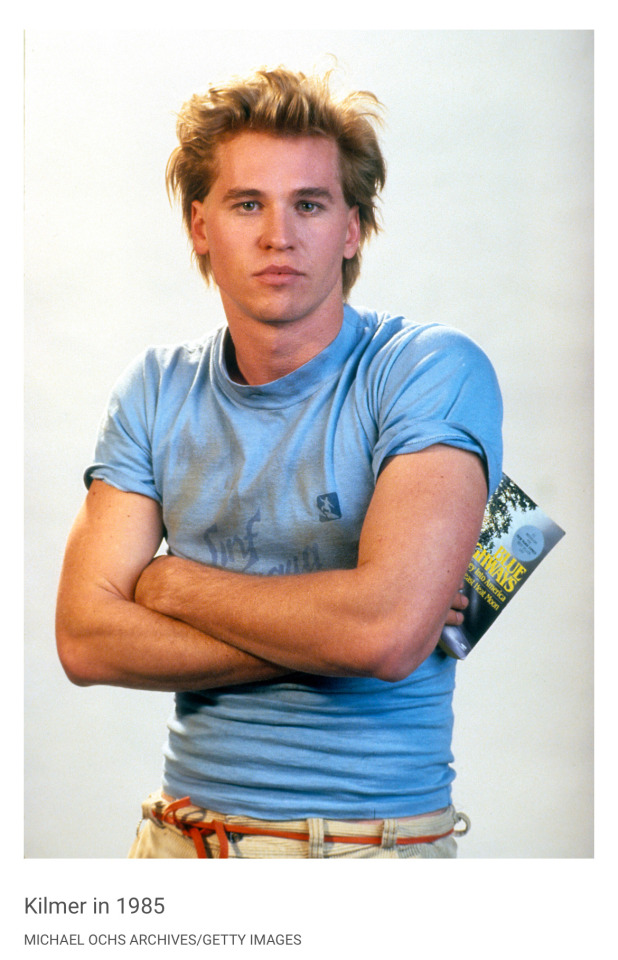
His career hit its zenith in the early 1990s as he made a name for himself as a dashing leading man, starring alongside Kurt Russell and Bill Paxton in 1993’s “Tombstone,” a bloody western, alongside Kurt Russell, Sam Elliott and Bill Paxton as Wyatt, Virgil and Morgan Earp; as Elvis’ ghost in “True Romance” and as a bank-robbing demolition expert in Michael Mann’s 1995 film “Heat” with Al Pacino and Robert De Niro, a contemporary urban “High Noon”-ish tale that was a vehicle for Robert De Niro as the mastermind of a heist and Al Pacino as the cop who chases him down.
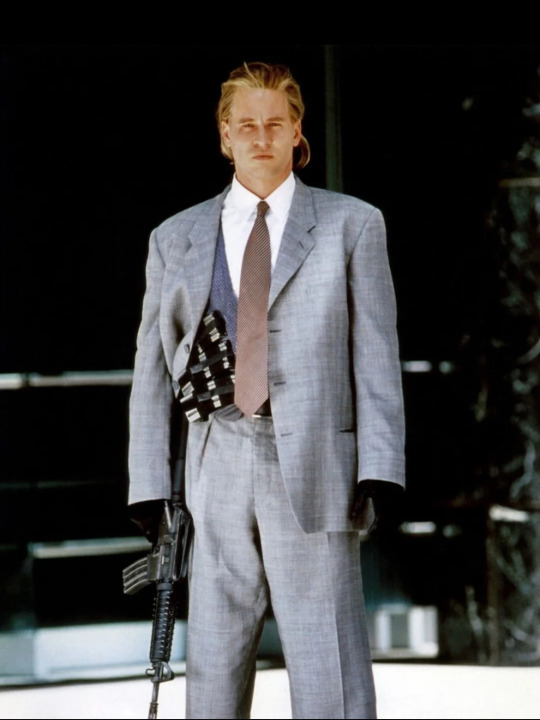
Kilmer — who took part in the Method branch of Suzuki arts training — threw himself into parts. When he played Doc Holliday in “Tombstone,” he filled his bed with ice for the final scene to mimic the feeling of dying from tuberculosis. To play Morrison, he wore leather pants all the time, asked castmates and crew to only refer to him as Jim Morrison and blasted The Doors for a year. In 1991, Kilmer cemented his status as a Hollywood A-lister thanks to his role as Jim Morrison in Oliver Stone's The Doors.
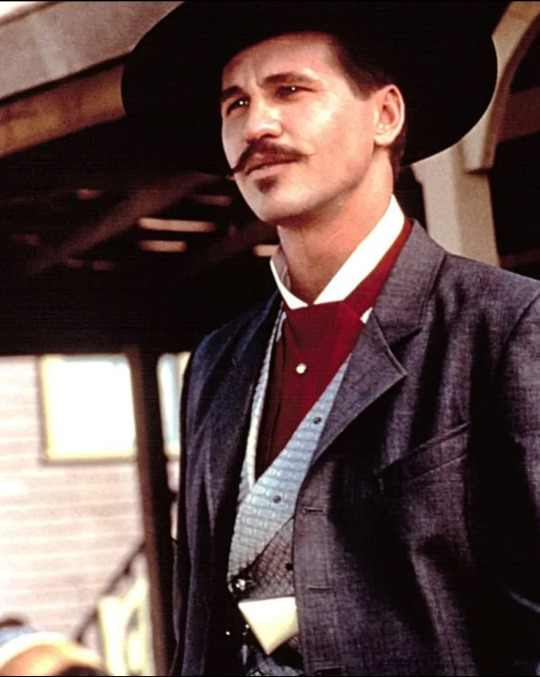
Kilmer missed out on an Oscar nomination for his portrayal of Doc Holliday in Tombstone ALAMY
Over the years, he gained a reputation as a temperamental, intense, perfectionist, which was exemplified by his performance as Jim Morrison in The Doors.
Kilmer reportedly recorded an eight-minute audition tape to convince Oliver Stone to cast him. He then lost weight and spent six months training his vocals to sing in the film, going on to perform 15 of the 50 songs he rehearsed for the film.
That intensity also gave Kilmer a reputation that he was difficult to work with, something he grudgingly agreed with later in life, but always defended himself by emphasising art over commerce.
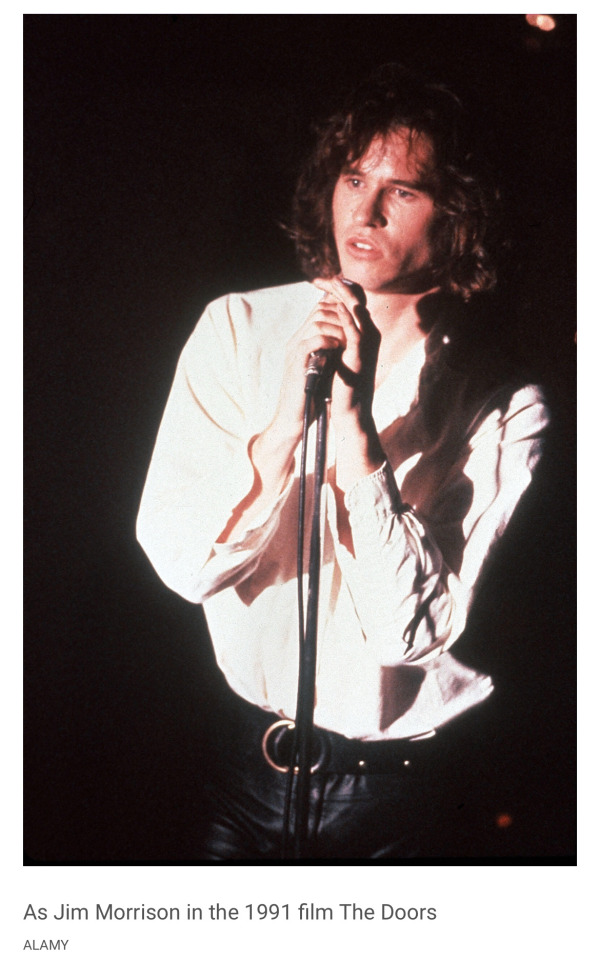
Val Kilmer as Bruce Wayne / Batman: A wealthy industrialist who duly works as Gotham City's vigilante protector but now struggles with his dual identity, becoming romantically involved with Dr. Chase Meridian and questioning his act of vengeance. Kilmer replaced Michael Keaton from the first two films.
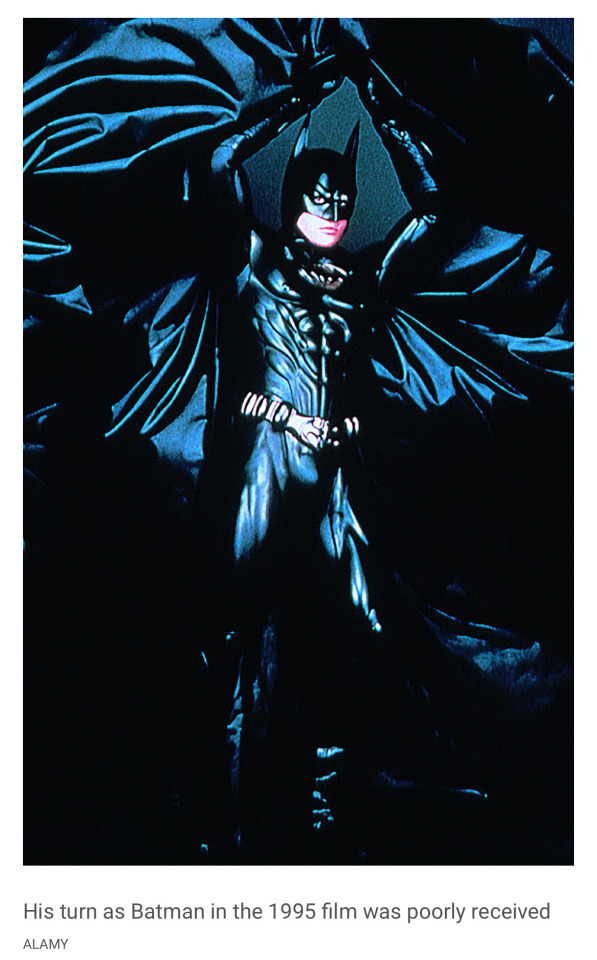
He was a co-star, billed beneath Michael Douglas, in “The Ghost and the Darkness” (1996), a period piece about lion hunting set in late 19th century a historical adventure set in Africa, where they portray an engineer and a hunter facing man-eating lions during the construction of a railway bridge. Kilmer, plays Colonel John Henry Patterson, an engineer tasked with keeping the workers on schedule and finishing the bridge's construction.
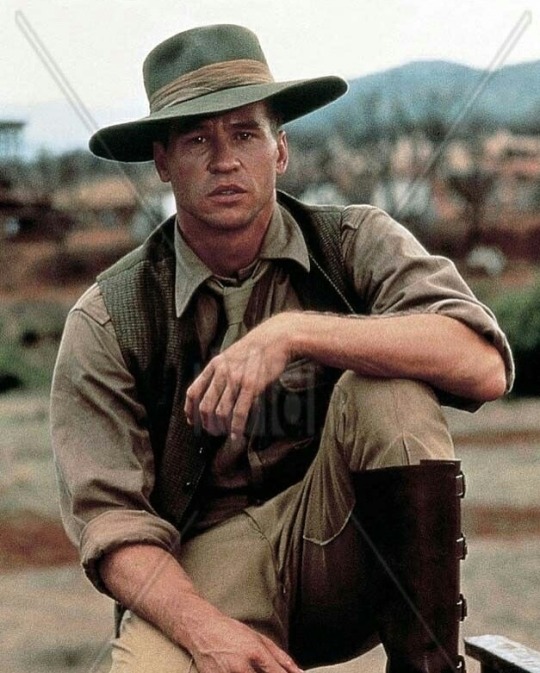
Val Kilmer, who voiced Moses in the 1998 animated film "The Prince of Egypt," waves to the crowd at a special screening of the film in Los Angeles on December 16, 1998. #AP Photo by Chris Pizzello
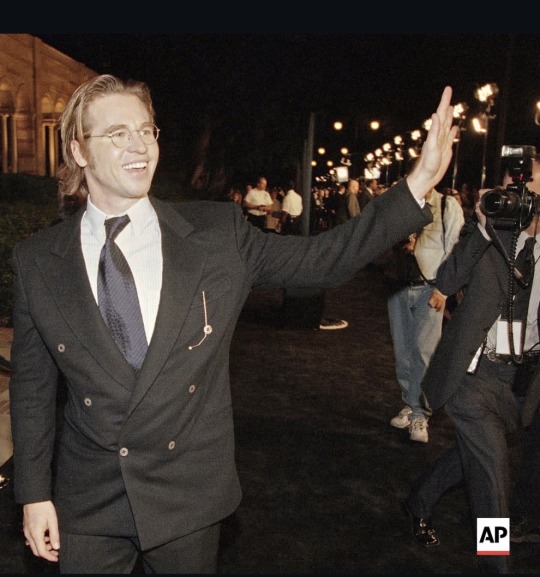
In “Pollock” (2000), starring Ed Harris as the painter Jackson Pollock, he was a fellow artist, Willem de Kooning. He played Philip of Macedon, the father of Alexander the Great (Colin Farrell), in Oliver Stone’s grandiose epic “Alexander” (2004).
Val Kilmer, with lofty ambitions and a combative personality rose to fame alongside Tom Cruise as his chisel-jawed wingman. The Kilmer and Cruise nostalgia hit home. Millions of people flocked to cinemas across the world and made Top Gun: Maverick a blockbuster. Emotions ran unchecked in cinemas; the box office responded. Top Gun: Maverick grossed a total of $1.496 billion (£1.160 billion) at the cinemas. It was perhaps an even bigger rage than the original.
Val Kilmer’s death comes after health struggles, documented in the 2021 film Val. Kilmer was diagnosed with throat cancer in 2015 and lost his voice after undergoing a tracheotomy. The actor initially kept the diagnosis private but came forward with his story to spread awareness of the disease.
Remembering Val Kilmer, Whether playing rock stars or the Caped Crusader, the late star brought dark charisma – and humour – to all his roles. Whose indelible cinematic mark spanned genres and generations. You will be forever missed and never forgotten RIP Iceman.
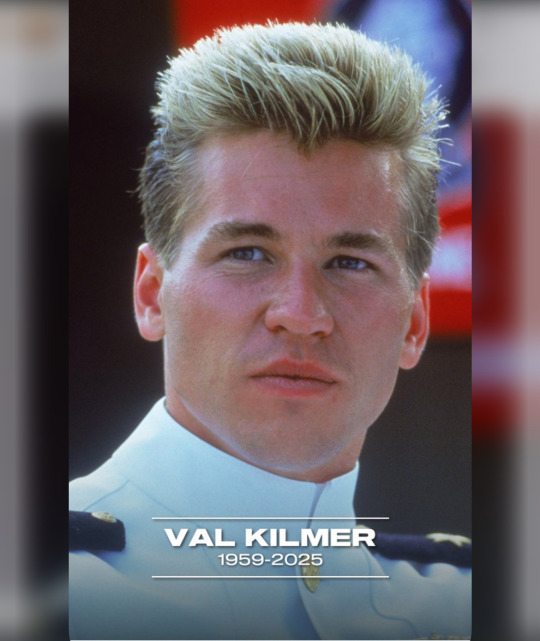
#ValKilmer #iceman #actor #JuilliardSchool
Rest in Peace Val Kilmer 1959 - 2025 🥀 🖤
Posted 2nd April 2025
20 notes
·
View notes
Text
The Birth of Charles II of Spain

Supposed portrait of Charles II as a newborn. Stirling Maxwell Collection (Pollock House, Glasgow), attributed to Martínez del Mazo.
Carlos José, Charles II of Spain, was born on Sunday, November 6, 1661. The news spread quickly throughout the Royal Palace in Madrid, releasing enormous tension barely contained until then. Joy filled all the rooms, as Queen Mariana's pregnancy had come to a happy conclusion. Given the challenges of the previous days and months, this was a significant relief. Just five days earlier, on November 1, 1661, the Feast of All Saints, the crown prince of the monarchy, the beloved and cherished Philip Próspero, had tragically died. His death was a profound loss for Philip IV and his wife, who was in an advanced stage of pregnancy at the time. With the passing of the young prince, the Catholic Monarchy once again faced a lack of direct male heirs, instilling a sense of pessimism and fatalism throughout the Palace and across the cities and kingdoms of the realm. The death of Don Felipe Próspero, who was only four years old, struck the heart of the aged King like a dagger, leading him to believe, with certainty, that God had abandoned him.
Queen Mariana was deeply distressed. She understood her royal husband's feelings well. From her earliest childhood, she had been educated about the reasons for the state and was aware of what dynastic inheritance meant, so she empathized with her husband's dual pain—both providential and political. Additionally, as a mother who had already lost several children, she felt overwhelmed by the painful fate that the Almighty had in store for her, a fate that undoubtedly shaped her harsh and rigid character. The death of Philip Prospero, who was taken from life too soon, was just the latest tragedy in a long series of losses. Indeed, Mariana had endured a profoundly tragic maternal experience.
For all the above reasons, in the days following the death of Philip Prospero, the Queen's pregnancy, which was nearing its end, became a matter of first importance. The future of the Monarchy depended on this event. On Sunday, November 6, everything seemed to be ready. The doctors and physicians were on alert; the Queen's confessor was near her, and the Chief Steward of her Household was carefully reviewing the arrangement of the items in the birth chamber. To guarantee the success of the event, all the holy relics that were in the Palace and others brought from El Escorial and other places had been arranged in order.
There was the staff of Saint Dominic of Silos that the Order of Saint Dominic had brought, the ribbon of Saint John Ortega, from the Order of the Hieronymites; the incorrupt bodies of Saint Isidore and Saint Diego de Alcalá; the image of the Virgin of Solitude and the one so venerated by the royal family, Our Lady of Atocha. It is difficult to find a space so holy and sacred. Everything, then, was ready, the things of the earth arranged in order to implore God's pleasure.
At noon, after a frugal lunch, Philip IV retired to his chambers. At the same time, the Queen felt discomfort and went to her room. The midwife, Doña Inés de Ayala, and the chief physician of the Royal Chamber, Don Andrés Ordóñez, both witnesses of the birth of Doña Mariana in Vienna in 1634, were now assisting her in her sixth birth, the most anticipated of all. Mariana of Austria was then 27 years old. The chronicles say that there was no setback. It was one o'clock in the afternoon on that Sunday, the day of San Leonardo, when, according to the Gazette, “
a very handsome prince with large features, a large head, black hair, and somewhat swollen flesh saw the light of this world .” It was, of course, a very favorable comment, but soon rumors to the contrary spread through the gossip columns of the Villa and Court. That birth was received with joy. At three in the afternoon, when the news had already spread to all corners of the Monarchy and Europe, a sober and elegantly dressed Philip IV in black velvet, left his chamber and, “
accompanied by the Nuncio, the Grand Masters and the Ambassadors ”, headed towards the Palace Chapel in full courtly etiquette. There, the royal procession, presided over by the monarch, sang a solemn Te Deum, thus beginning the festivities that, in honor of the future Charles II, occupied the entire month of November 1661.
#history#mariana de austria#house of habsburg#spain#art#charles ii of spain#habsburg#17th century#carlos ii#please like and reblog#facts people should know#facts#fun facts#interesting facts#childbirth#birth#Happy birthday Charles II of Spain#birth story#The fanart will be delayed sorry#coming soon#baroque
39 notes
·
View notes